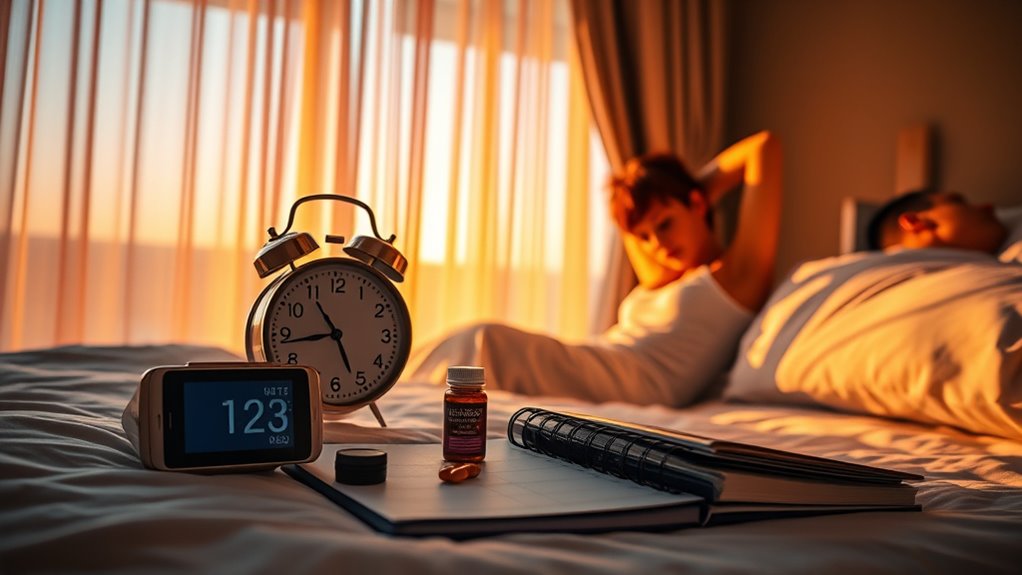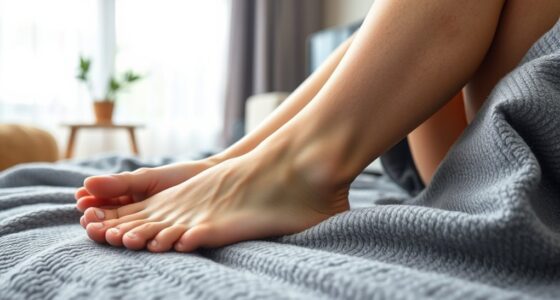To reduce jet lag, manage your light exposure by seeking natural sunlight in the morning for eastward trips or in the evening for westward ones, helping your internal clock adjust faster. Take melatonin 30-60 minutes before your target bedtime to support sleep during adaptation. Also, plan your travel schedule by aligning sleep and meal times with your destination’s time zone before departure. Keep exploring for more tips to ease your adjustment process.
Key Takeaways
- Use natural sunlight and artificial light to strategically shift your circadian rhythm based on travel direction.
- Take melatonin 30-60 minutes before bedtime at your destination to promote sleep and adjust your internal clock.
- Adjust sleep and meal times gradually before travel to align with the new time zone.
- Schedule flights arriving during daylight to maximize natural light exposure for quicker adaptation.
- Combine light exposure, scheduled sleep, and melatonin use for the most effective jet lag mitigation.
Managing Light Exposure to Reset Your Body Clock

Have you ever wondered how light influences your internal clock? Your circadian rhythm, the body’s natural 24-hour cycle, is tightly regulated by light exposure. When you travel across time zones, your internal clock gets out of sync, causing jet lag. Light therapy can help reset this rhythm by exposing yourself to bright light at strategic times, signaling your brain to adjust your sleep-wake cycle. In the morning, bright light can advance your circadian rhythm if you’ve traveled east; in the evening, it can delay it for westward trips. Be mindful of your light exposure, using natural sunlight whenever possible, and consider artificial light sources if needed. Proper management of light exposure is a powerful tool to realign your internal clock quickly.
Using Melatonin Supplements Effectively

Using melatonin supplements can be an effective way to reduce jet lag, especially when timed correctly. To optimize results, pay attention to dosage timing—taking it at the right moment helps signal your body to adjust. Typically, taking melatonin 30 to 60 minutes before your desired bedtime at the destination works best. Also, make certain you’re using high-quality supplements; supplement quality influences effectiveness and safety. Look for reputable brands with accurate dosing and minimal additives. Avoid excessive doses, as more isn’t always better and can cause side effects. Consistency is key: stick to your schedule and avoid taking melatonin at irregular times. When used properly, melatonin can support your body’s adaptation to a new time zone, easing the transition and improving your sleep. Proper timing of melatonin intake can be especially important if you are also managing light exposure, which plays a significant role in circadian rhythm regulation. Incorporating sleep hygiene practices alongside melatonin can further enhance your adjustment process. Additionally, understanding how glycolic acid benefits can improve skin health may help you prepare your skin for travel-related stressors.
Planning Your Travel Schedule for Optimal Adjustment

To maximize your body’s adjustment to a new time zone, planning your travel schedule thoughtfully is essential. You should aim to align your sleep environment with the destination’s schedule by adjusting your sleep times before departure. This helps your body adapt gradually and reduces jet lag symptoms. Additionally, consider dietary timing—eating meals according to the new time zone can help reset your internal clock more quickly. During travel, stay hydrated and avoid heavy or caffeine-laden foods that could disrupt sleep or cause discomfort. If possible, schedule your flight to arrive during daylight hours, giving you exposure to natural light, which aids in circadian adjustment. Incorporating light exposure strategies can further enhance your adaptation process. Using sleep environment adjustments, such as bringing a sleep mask or earplugs, can also promote better rest during your journey. Optimizing your sleep schedule before and during travel supports a smoother transition, helping your body adapt more efficiently to the new time zone.
Frequently Asked Questions
Can Jet Lag Affect Mental Health Long-Term?
Jet lag can impact your mental health long-term if it disrupts your sleep patterns and circadian rhythm regularly. When your sleep cycle is off, you might experience increased stress, mood swings, or anxiety over time. Persistent misalignment can lead to deeper mental health issues. To prevent this, it’s important to restore your sleep patterns quickly after travel and maintain a consistent circadian rhythm.
Are There Specific Diets That Help Reduce Jet Lag?
They say, “You are what you eat,” and that applies to jet lag too. While no specific diet plans guarantee quick recovery, nutritional strategies focusing on balanced meals rich in complex carbs, protein, and hydration can help. Avoid heavy or greasy foods before travel. Incorporate light, nutritious snacks to support energy levels. Proper diet plans aid your body’s adaptation, making it easier to adjust to new time zones efficiently.
How Does Age Influence Jet Lag Recovery?
Age influences your jet lag recovery because age-related sleep patterns and senior circadian rhythms change over time. As you get older, your internal clock becomes less flexible, making it harder to adjust quickly to new time zones. You might find that recovery takes longer, and you may need additional strategies to reset your circadian rhythms. Understanding these changes helps you better prepare and manage jet lag as you age.
Can Exercise Speed up Adjustment to New Time Zones?
You might find that exercise routines can help you adjust to new time zones faster. Regular physical activity can boost your energy levels and improve sleep timing, making it easier to adapt. Timing your workouts appropriately, such as exercising in the morning or early afternoon, can reinforce your new schedule. Just avoid intense exercise close to bedtime, as it might interfere with your sleep and delay your adjustment process.
Are There Natural Remedies Besides Melatonin for Jet Lag?
You might think there’s no magic cure for jet lag besides melatonin, but surprisingly, herbal supplements and acupuncture therapy could be your secret weapons. These natural remedies are believed to help regulate your body’s internal clock and reduce fatigue. While scientific evidence varies, many travelers swear by herbal teas or acupuncture sessions to ease symptoms. Give them a try, and you might find your jet lag fades faster than you ever imagined.
Conclusion
By mastering light exposure, using melatonin wisely, and planning your schedule, you can outsmart jet lag like a modern-day Odysseus. Think of your body’s clock as your personal ship; with the right navigation, you’ll sail smoothly through time zones. Embrace these strategies, and soon you’ll feel as unstoppable as a hero returning home, ready to conquer your adventures with energy and ease. Your journey to seamless travel starts now—set your course wisely.









